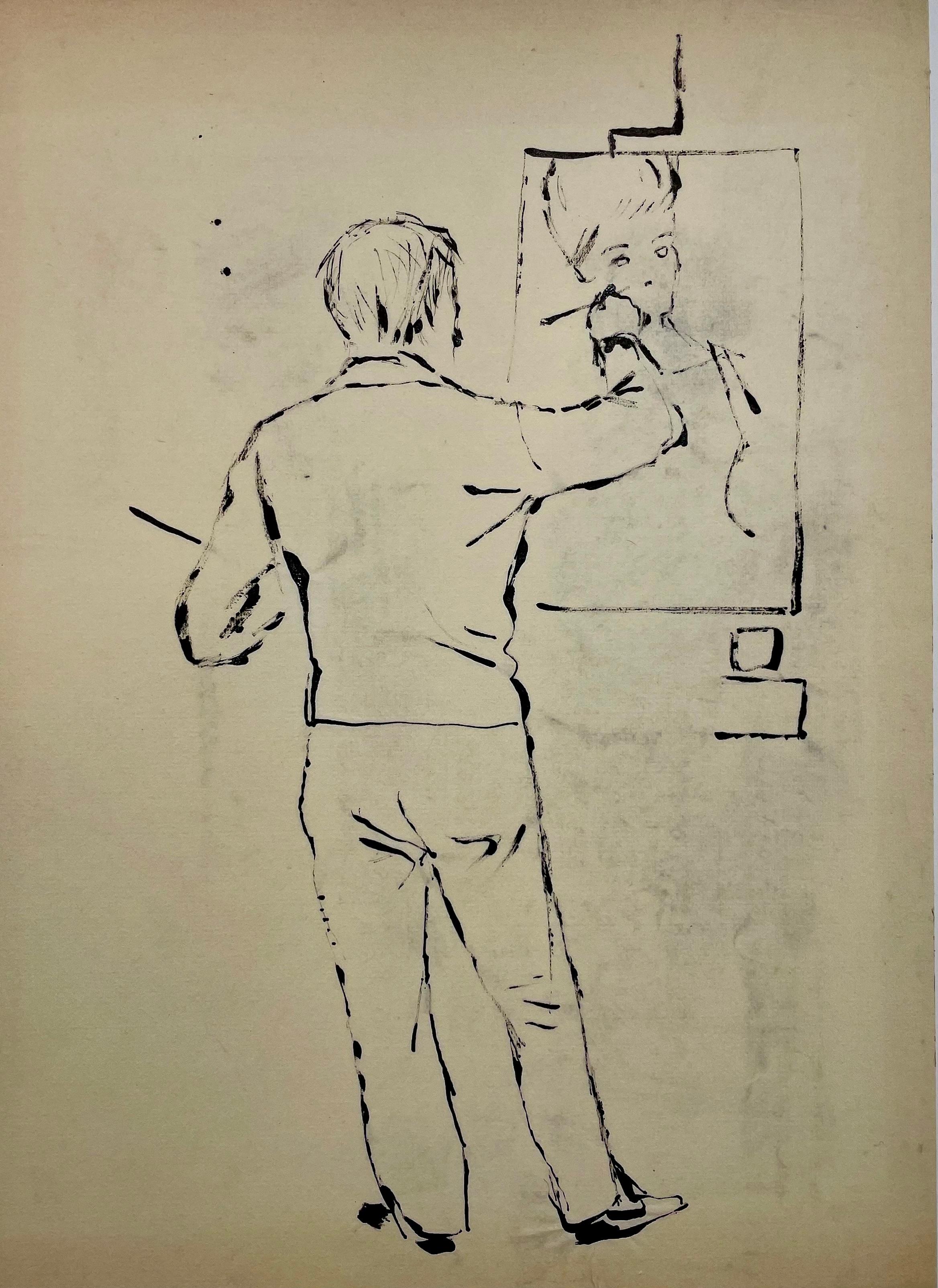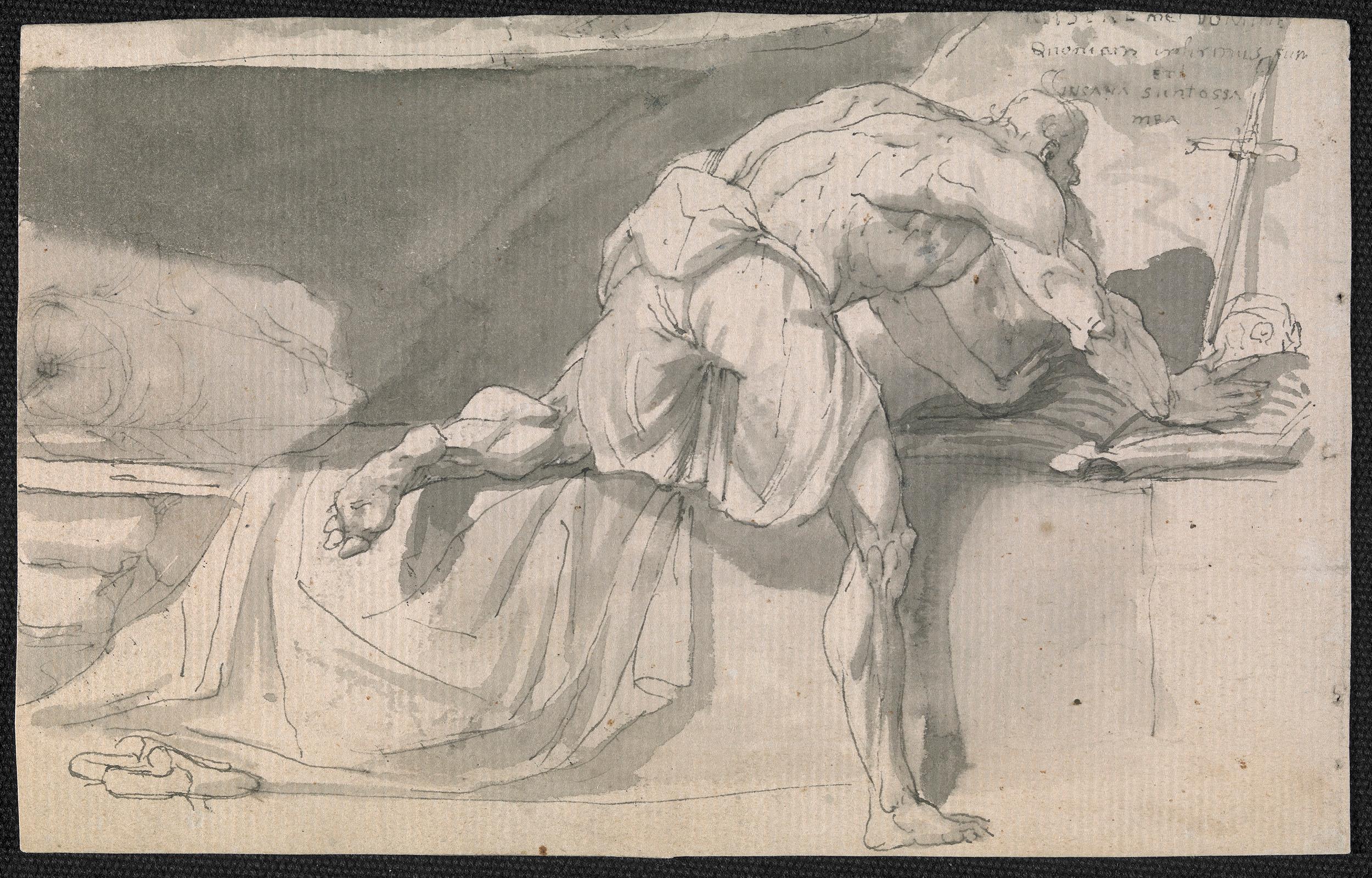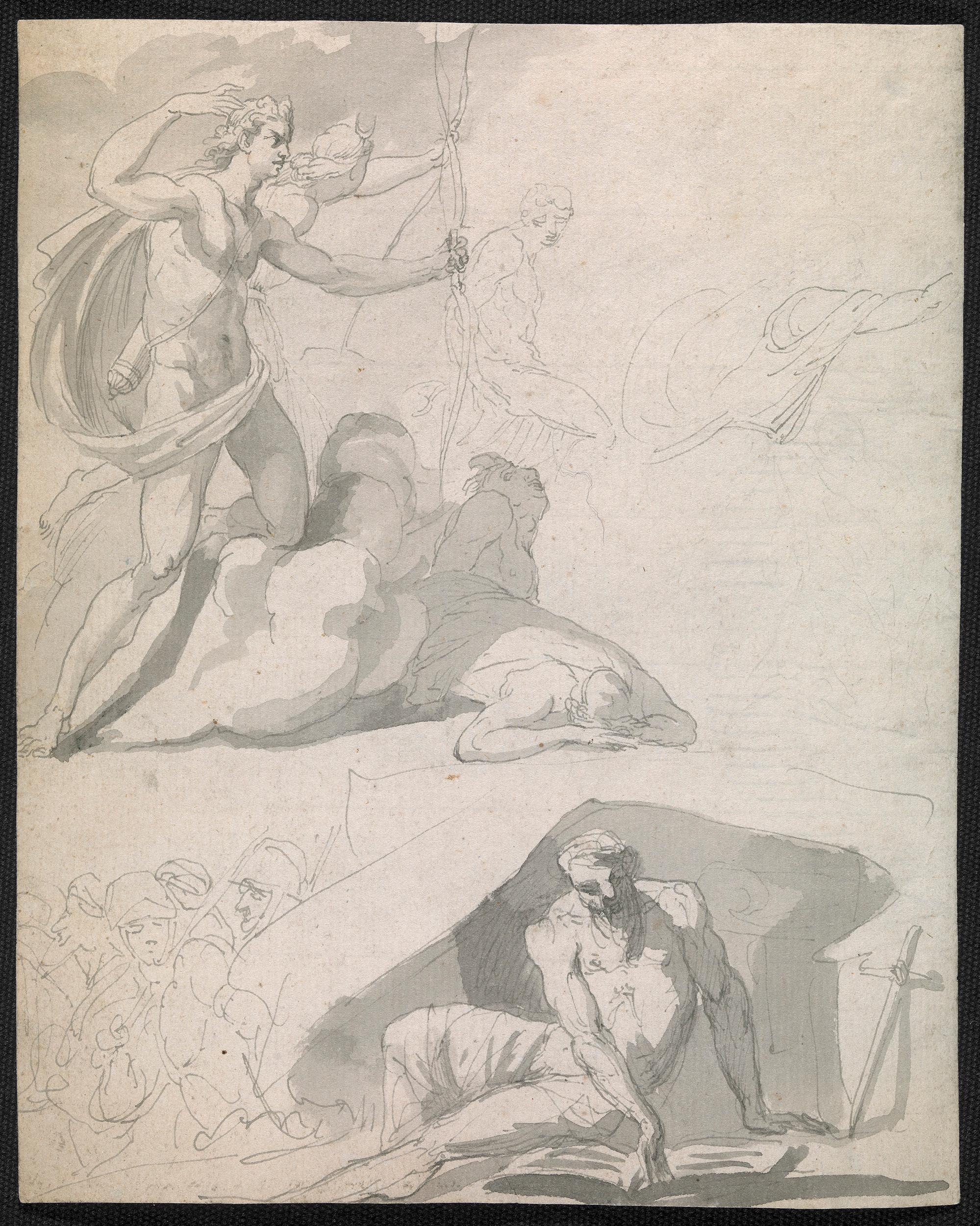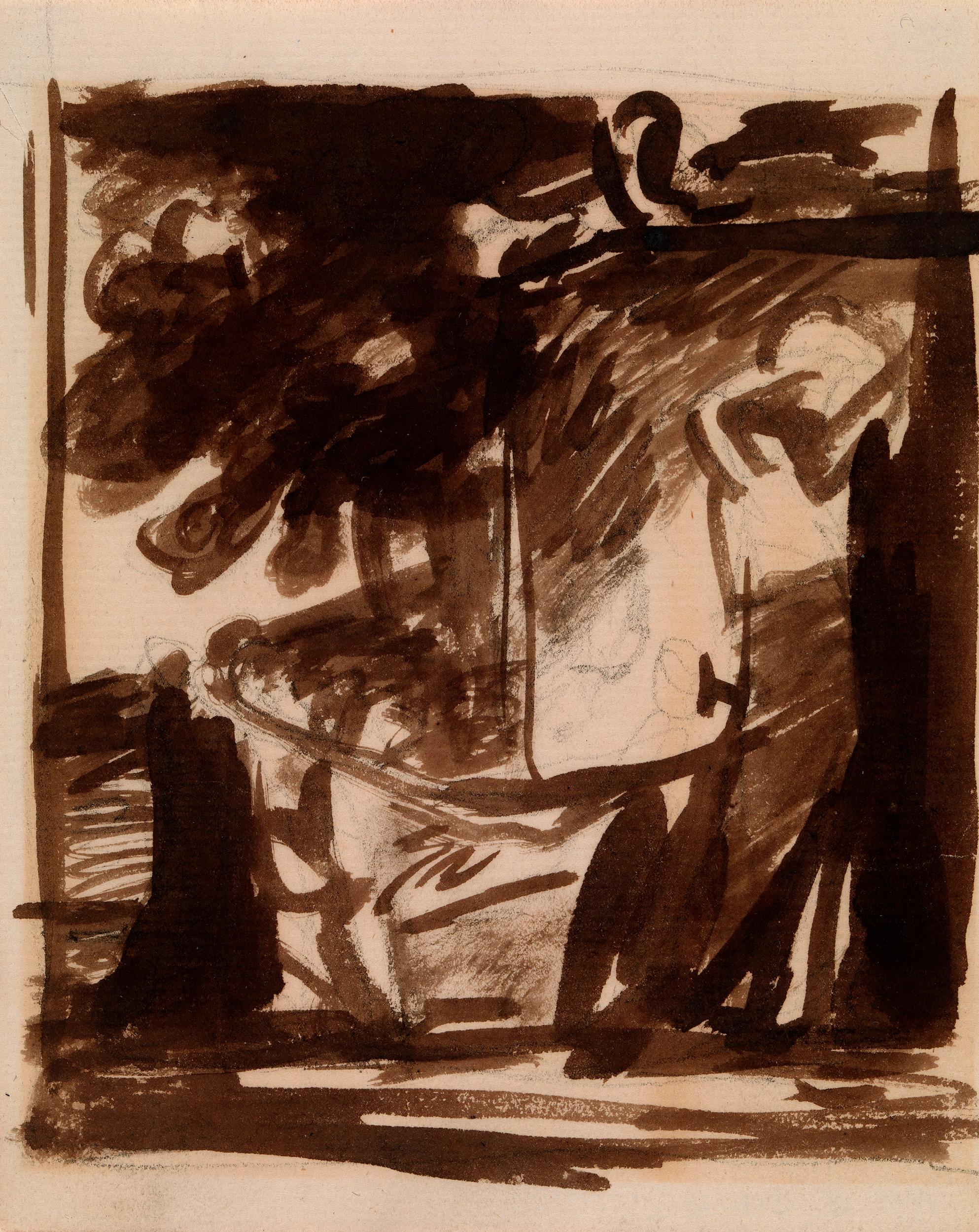Items Similar to The Olympus - China Ink Drawing by Jean Cocteau - 1920s
Want more images or videos?
Request additional images or videos from the seller
1 of 2
Jean CocteauThe Olympus - China Ink Drawing by Jean Cocteau - 1920s1920 ca.
1920 ca.
About the Item
The particular framing of this image gives the scene a strong sense of movement, that is also underlined by the pose
of the figure.
This artwork is shipped from Italy. Under existing legislation, any artwork in Italy created over 70 years ago by an artist who has died requires a licence for export regardless of the work’s market price. The shipping may require additional handling days to require the licence according to the final destination of the artwork.
- Creator:Jean Cocteau (French)
- Creation Year:1920 ca.
- Dimensions:Height: 12.6 in (32 cm)Width: 9.65 in (24.5 cm)Depth: 0.04 in (1 mm)
- Medium:
- Period:
- Framing:Framing Options Available
- Condition:Insurance may be requested by customers as additional service, contact us for more information.
- Gallery Location:Roma, IT
- Reference Number:
About the Seller
4.9
Platinum Seller
These expertly vetted sellers are 1stDibs' most experienced sellers and are rated highest by our customers.
1stDibs seller since 2017
6,726 sales on 1stDibs
Typical response time: 2 hours
- ShippingRetrieving quote...Ships From: Rome, Italy
- Return PolicyA return for this item may be initiated within 14 days of delivery.
More From This SellerView All
- Landscape - Original Ink and Watercolour by Alfred Sobottka - 1948Located in Roma, ITLandscape is an Original Watercolour realized by Alfred Sobottka in 1948. Good condition on a cream colored cardboard. Hand-signed and dated by the artist on the lower right corner.Category
1940s Modern Landscape Drawings and Watercolors
MaterialsWatercolor, Ink
- America's Demons Have Gathered - China Ink Drawing - Late 20th centuryBy Albert DecarisLocated in Roma, ITAmerica's Demons Have Gathered is a china ink drawing realized in the late 20th Century by Albert Decaris, sketch for "Essais d'histoire politique des etats - unis de Rogin Michael ...Category
Late 20th Century Modern Figurative Drawings and Watercolors
MaterialsInk
- The General - Original ink Drawing by Edouard Detaille - 1900sLocated in Roma, ITThe General is an original drawing on paper realized by Edouard Detaille ( 1848-1912). Applied on a white Passepartout. Hand-signed on the lower righ...Category
Early 1900s Modern Figurative Drawings and Watercolors
MaterialsInk
- A couple - Original drawing in china ink on paper by Erhard Klepper - 1956By Erhard KlepperLocated in Roma, ITA couple is an original drawing in china ink on paper realized in 1956 by Erhard Klepper (1906-1980). Hand-signed and dated on the higher margin The state of preservation is good ...Category
1950s Modern Figurative Drawings and Watercolors
MaterialsInk
- The Stalker - Watercolor Drawing by Luigi Bompard - 1920sLocated in Roma, ITThe Stalker is an original watercolored ink drawing on ivory-colored paper, in the 1920s realized by Luigi Bompard (1879-1953). Hand-signed in pen on the lower margin. In good con...Category
1920s Art Deco Figurative Drawings and Watercolors
MaterialsInk, Watercolor
- Figures - Drawing by Hermann Paul - Early 20th CenturyLocated in Roma, ITFigures is an original modern artwork realized in France by Hermann-Paul (1879 - 1969). Original China Ink on a yellowed paper. Passepartout is included (dimensions: cm 35 x 0....Category
Early 20th Century Modern Figurative Drawings and Watercolors
MaterialsInk, Paper
You May Also Like
- HUBER Johann Kaspar. View of a city thought to be Antwerp. Wasked ink.By HUBER JOHANN KASPARLocated in Paris, FRJohann Kaspar HUBER is a Swiss painter.Category
Late 18th Century Landscape Drawings and Watercolors
MaterialsInk
- HUBER Johann Kaspar. View of a city thought to be Antwerp. Wasked ink.By HUBER JOHANN KASPARLocated in Paris, FRJohann Kaspar HUBER is a Swiss painter.Category
Late 18th Century Landscape Drawings and Watercolors
MaterialsInk
- “Guy au portrait de madame Descazeaux” / Guy (Bardone) in the portrait of MadameBy René GenisLocated in Berlin, MDRene Genis (French 1922-2004) “Guy au portrait de madame Descazeaux” / Guy (Bardone) in the portrait of Madame Descazeaux. Ink on paper laid down on matt board. Unsigned. Image siz...Category
Mid-20th Century French School Portrait Drawings and Watercolors
MaterialsIndia Ink
- Eighteenth century Old Master drawing - St JeromeBy John Hamilton MortimerLocated in London, GBPen, ink and wash Framed dimensions: 9 ½ x 11 ¼ inches Drawn c. 1763 This small, powerful study shows St Jerome contemplating the bible with a cross and sk...Category
18th Century Old Masters Figurative Drawings and Watercolors
MaterialsInk, Pen
- Eighteenth century Old Master drawing - Apollo destroying Niobe's childrenBy John Hamilton MortimerLocated in London, GBPen, ink and wash Framed dimensions: 13 x 11 ¼ inches Drawn c.1765 Verso: a study of a hanged man Mortimer has filled this small sheet with action, depicting in the top right, Apollo and Artemis...Category
18th Century Old Masters Figurative Drawings and Watercolors
MaterialsInk, Pen
- 18th century ink study for the Leveson-Gower ChildrenBy George RomneyLocated in London, GBCollections: J. Goodfriend, USA. Brown wash and pencil on laid paper Framed dimensions: 13.25 x 11.75 inches This powerful drawing was made at the time that Romney was painting the famous group portrait of the Gower Children now in Abbot Hall Art Gallery, Kendal. Romney was a bold and incisive draughtsman who made numerous rich brown ink studies, principally for historical compositions; by contrast, comparatively few studies linked directly to his portraits survive. The existence of a group of studies for the Gower Children underscores its importance to Romney. The sitters were the five youngest of the eight children of Granville, 2nd Earl Gower who, at the time the portrait was commissioned, was President of the Council in Lord North’s government and one of the best-connected and most influential people in England. The present drawing which is a large scale treatment of the composition in its final form perfectly distils Romney’s conceit: the younger children dancing whilst their elder sister, in the guise of a Bacchante plays the tambourine. The bold and dramatic study underlines both the artistic confidence and classical grandeur Romney gained during his trip to Italy between 1773 and 1775. The commission from Granville, 2nd Earl Gower to paint five of his children came shortly after Romney’s Continental tour. The initial idea, as represented by the present drawing, seems to have been to paint Lady Anne, the figure on the right of the composition playing the tambourine, who was the youngest of Gower’s first four children by his second wife Lady Louisa Egerton and who married the Rev. Edward Vernon Harcourt, later Archbishop of York, with three of her younger half-siblings by Gower’s third wife, Lady Susanna Stewart: at the left Lady Georgina, who became Countess of St Germans following her marriage to the Hon. William Eliot; at the right Lady Charlotte Sophia, later Duchess of Beaufort and in the centre Lady Susanna, later Countess of Harrowby. Romney added a fifth child to the finished portrait, Gower’s son: Lord Granville, later created Viscount Granville and Earl Granville. In Italy Romney had produced a large number of studies of classical antiquities and old master paintings. The commission from Gower offered Romney the opportunity to explore a complex multi-figural group, putting into practice the kind of ambitious classical quotations that Reynolds was currently exploiting. In 1773 Reynolds had completed the remarkable group portrait of the Montgomery Sisters, now in the Tate Gallery, London, which showed them adorning a herm of the Roman god Hymen; the composition used a garland to link the three figures who were shown in classical costume dancing at the foot of a Roman sculpture. Scholars have long pointed to a similar sources for the two compositions: the works of Nicolas Poussin. Whilst the Montgomery Sisters is based, in part, on a Bacchanal now in the Musée des Beaux-Arts, the Gower Children has always been associated with Poussin’s Dance to the Music of Time, now in the Wallace Collection, London. It seems more likely that Romney was looking to an antique source in the form of the Borghese Dancers, a Roman relief, then in Palazzo Borghese in Rome. Romney would have seen the relief of interlocking, dancing maidens and would also have known Guido Reni’s Aurora...Category
18th Century Old Masters Portrait Drawings and Watercolors
MaterialsInk, Pencil
Recently Viewed
View AllMore Ways To Browse
Orange Drawing
Chinese Drawing From China
1929 Drawing
Dior 1920s
1920s Original Painting
China Ink Drawings
Chinese Ink Drawing
Cocteau Jean
Dior China
Chinese Orangal Painting
Chinese Market Painting
Original Jean Cocteau
Cocteau Original Drawing
China Export Watercolour
Jean Cocteau Original Drawing
Olympus Art
Jean Cocteau On Sale
Vintage Glasses Drawing



